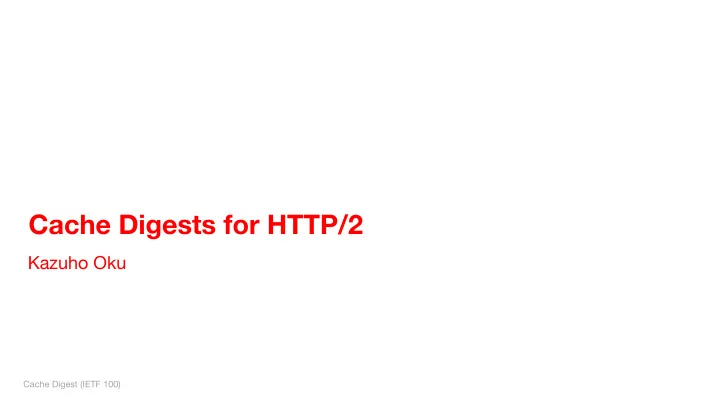

Cache Digests for HTTP/2 Kazuho Oku Cache Digest (IETF 100)
Pull Request #413 • proposes: – SENDING_CACHE_DIGEST SETTINGS Parameter – switch to Cuckoo hashing – thanks to Yoav Weiss for the proposal Cache Digest (IETF 100)
SENDING_CACHE_DIGEST • a SETTINGS parameter sent by client – “I’m going to send CACHE_DIGEST, so the server should decide what to push after seeing the digest” • discussion: – CACHE_DIGEST frame has “origin” field. Do we need to associate the flag to each origin, or is SETTINGS parameter fine? – do we need a way to retract the announcement? • i.e. “I said I am going to send CACHE_DIGEST, but I cannot” Cache Digest (IETF 100)
Switch to Cuckoo Hashing • client-side: – no need to iterate through the browser cache when generating the CACHE_DIGEST frame – the hash becomes a persistent structure in the browser cache • allowing O(1) insertion and removal of URLs • O(N) when resizing happens – resizing requires additional data to be associated to the entries of the hash • server-side: – no need to decode the frame before lookup • digest becomes slightly(?) larger Cache Digest (IETF 100)
Cuckoo Hashing – no distinction bet. fresh vs. stale • what should we include in the digest? a) hash(URL): • meaningless for stale-cached responses • waste of bandwidth if the majority of cached responses are stale b) hash(URL+etag): • server needs to know the etag of the resource it might push in order to determine if it should push • client needs to respect (i.e. save) the pushed response even if it already has a freshly-cached object with the same URL • pull request proposes b Cache Digest (IETF 100)
Cuckoo Hashing – the options • a) replace Golomb Coded Sets with Cuckoo Hashing? • b) define both algorithms? – might not be an option due to the stale vs. fresh distinction • c) stick to using Golomb Coded Sets – can be generated by browser from Cuckoo Hash with additional data Cache Digest (IETF 100)
Recommend
More recommend